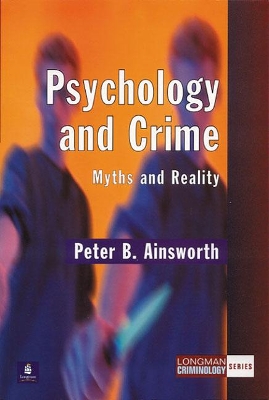Longman Criminology
1 total work
LONGMAN CRIMINOLOGY SERIES
Series editor Tim Newburn
In Psychology and Crime: Myths and Reality Peter Ainsworth provides an accessible and intriguing introduction to some of the links between the fields of psychology and crime. As such the book offers a number of psychological perspectives on criminal behaviour and the criminal justice process. The author challenges many of the misconceptions and misunderstandings surrounding criminal behaviour while at the same time providing valuable insights into the way in which psychology can help us to make sense of the criminal process. Among the questions addressed in the book are: How easy is it to measure the level of crime in society? Why are people's fears of crime often greater than their level of risk might justify? Why are some people victimized repeatedly while others suffer little crime? What are the psychological effects of victimization? Can psychology help to prevent crime? Are criminals born or made? What are the links between crime and mental illness? Can psychologists help the police to solve crime by providing offender profiles? Are the processes of jury decision making and judicial sentencing objective or subjective? How best can we prevent reoffending? How and why do mistakes occur in the criminal justice system?
Undergraduate and postgraduate students in forensic, legal and applied psychology, and those studying law and criminology will find this a useful introduction to the area. In addition, those working within the criminal justice system should find this non-technical guide extremely useful.
Series editor Tim Newburn
In Psychology and Crime: Myths and Reality Peter Ainsworth provides an accessible and intriguing introduction to some of the links between the fields of psychology and crime. As such the book offers a number of psychological perspectives on criminal behaviour and the criminal justice process. The author challenges many of the misconceptions and misunderstandings surrounding criminal behaviour while at the same time providing valuable insights into the way in which psychology can help us to make sense of the criminal process. Among the questions addressed in the book are: How easy is it to measure the level of crime in society? Why are people's fears of crime often greater than their level of risk might justify? Why are some people victimized repeatedly while others suffer little crime? What are the psychological effects of victimization? Can psychology help to prevent crime? Are criminals born or made? What are the links between crime and mental illness? Can psychologists help the police to solve crime by providing offender profiles? Are the processes of jury decision making and judicial sentencing objective or subjective? How best can we prevent reoffending? How and why do mistakes occur in the criminal justice system?
Undergraduate and postgraduate students in forensic, legal and applied psychology, and those studying law and criminology will find this a useful introduction to the area. In addition, those working within the criminal justice system should find this non-technical guide extremely useful.
